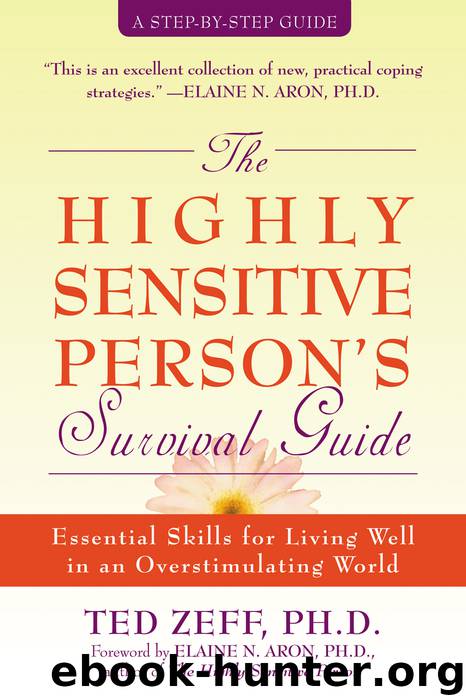The Highly Sensitive Person's Survival Guide by Zeff Ted Aron Elaine

Author:Zeff, Ted, Aron, Elaine
Language: eng
Format: epub, mobi
ISBN: 9781608828487
Publisher: New Harbinger Publications
How Exercise and Diet Affect Sleep
As we saw in the last chapter, regular exercise reduces anxiety since your body releases endorphins that actually reduce stress. If you’ve been sitting all day in front of a computer, you may be restless at night and want to move around when you should be physically tired and ready for sleep. A lack of physical exercise can also contribute to insomnia by inhibiting the daily rise and fall of body temperature (Jacobs 1998). Exercise raises body temperature, which is followed by a drop three hours later, promoting sleep. It’s not good to exercise in the evening because the body needs those three hours to cool down. If you want to exercise in the early evening you can go for a slow walk or do some gentle yoga postures.
Lena, a single HSP in her twenties, had a passion for dancing. Unfortunately, her dance classes and performances most often took place late at night. She continually complained that when she wanted to fall asleep at midnight she would toss and turn for hours even though she was physically exhausted. How could she possibly fall asleep after being overstimulated, raising her body temperature, and trying to fall asleep at midnight (a more stimulating time)? Lena was in quite a dilemma since she refused to give up her regular dance schedule. Interestingly, many non-HSPs would still be able to fall asleep after participating in the same stimulating activity. Since she refused to give up dancing, I suggested that she could either explore the possibility of pursuing her hobby in the late afternoon or early evening. However, if she maintained her present routine, she would continue to have sleep problems. By the way, I don’t think the song “I Could Have Danced All Night” was written by an HSP.
It’s beneficial to finish eating a light dinner by 7 P.M., and it’s better to eat spicy foods for lunch rather than for dinner. Since it takes two to three hours to digest a meal, late-night dinners could contribute to insomnia. Eating some complex carbohydrates such as a piece of sprouted bread or some rye crackers before bedtime can increase serotonin, a brain neurotransmitter that may induce sleep. However, eating most forms of protein can inhibit sleep by blocking the synthesis of serotonin (Jacobs 1998).
Eating foods that are heavy, warm, and moist may help promote sleep. This kind of diet is both nurturing and centering, especially in the winter. One HSP tried going on a raw food diet. She told me that as soon as she began the diet, she started having trouble sleeping. Once she returned to a diet of cooked foods, she reported that she felt calmer and slept better. I recommend eating more cooked vegetables in the winter and more salads in the summer.
Drinking some warm milk with nutmeg an hour before bedtime may help you sleep. Nutmeg has natural calming properties (Frawley 1989). Also, drinking a glass of herb tea (such as chamomile) in the evening can relax the nervous system.
Download
The Highly Sensitive Person's Survival Guide by Zeff Ted Aron Elaine.mobi
This site does not store any files on its server. We only index and link to content provided by other sites. Please contact the content providers to delete copyright contents if any and email us, we'll remove relevant links or contents immediately.
Daring Greatly by Brene Brown(6492)
You Do You by Sarah Knight(4460)
The Confidence Code by Katty Kay(4239)
Ikigai by Héctor García & Francesc Miralles(4222)
He's Just Not That Into You by Greg Behrendt & Liz Tuccillo(3873)
The Courage to Be Disliked by Ichiro Kishimi & Fumitake Koga(3472)
Toxic Parents by Susan Forward(3273)
Make Your Bed by William H. Mcraven(3168)
Self-Esteem by Matthew McKay & Patrick Fanning(3129)
365 Days of Wonder by R.J. Palacio(2811)
The Gaslight Effect by Dr. Robin Stern(2784)
The Gifts of Imperfection by Brene Brown(2552)
Dare to Lead by Brené Brown(2430)
The Charisma Myth: How Anyone Can Master the Art and Science of Personal Magnetism by Cabane Olivia Fox(2415)
The Modern Alpha Male: Authentic Principles to Become the Man You Were Born to Be: Attract Women, Win Friends, Increase Confidence, Gain Charisma, Master Leadership, and Dominate Life - Dating Advice by Patrick King(2327)
Parisian Charm School by Jamie Cat Callan(2278)
How to Own Your Own Mind by Napoleon Hill(2272)
The Year of the Introvert by Michaela Chung(2264)
How to Make Small Talk by Melissa Wadsworth(2226)
